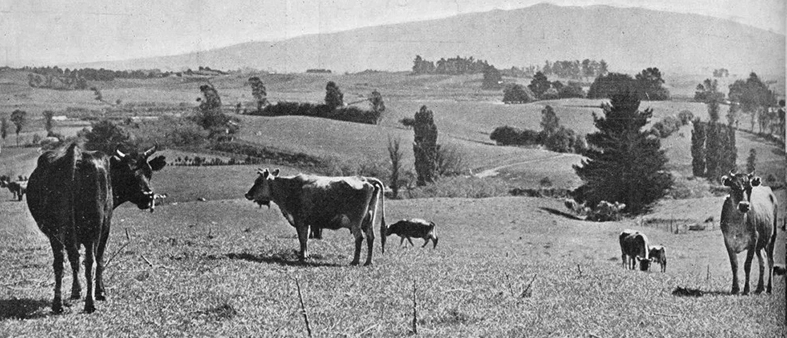
A panorama of fertile dairy lands in the Ōhaupō district, with Mount Pirongia in the background.
Te Awamutu cattle took a liking to paying surprise visits.
Mr W Phillips, jeweller, had an unwelcome customer in the shape of a steer which quietly walked into his shop while being driven from the sale yards. After a close examination of a sewing machine the steer departed but not before smashing a chair on which it had endeavoured to sit and giving the proprietor a bit of a scare. Two curious cows also visited the Te Awamutu Hotel. One walked into the new saloon bar and after inspecting the interior, vainly tried to make an exit through one of the mirrors in which an open door was reflected. After some persuasion the cow was induced to visit other fields. The other cow made an unconducted tour of the upstairs but was summarily ejected. Rumours swept Te Awamutu that host Jackson was keeping a milch cow in the bar for those desiring fresh milk with their whisky.
Pirongia farmers were relieved to have separators installed at their homesteads so that they no longer had to take milk to the factories. One wagon would now be able to take the cream from a dozen farmers to the depot. The innovation was to save a lot of horse wear, cart wear, road wear, and hard swearing, especially when mud roads were full of bog holes.
The Kihikihi Town Board wrote to the Waipā County Council regarding Lyon Street, which was in a disgraceful condition. The council was asked to scrape the mud off the street, which was the main thoroughfare, used daily by residents. When crossing from one side of the road to the other mud went over their boot tops. In a letter to the board, Mr Elmsly complained about smoking in the town hall. The local constable was to be instructed to take the matter in hand and put a stop to the nuisance. The caretaker was deputed not to allow people to go up into the gallery while there was sufficient room in the body of the hall, as considerable smoking was carried on in the gallery.
An Italian settler from Wellington, Mr B Russo, became enamoured of southern Waikato country and planned to improve an extensive block of land in the Te Awamutu district. Knowing something of the cultivation of citrus, he foresaw a favourable prospect for these when grown on the right principles. In the orchard near Te Awamutu there was a large orange tree carrying about 35 cases of fruit. This tree was left entirely to itself. Fruit was generally picked just before ripening, in order to give a chance to the remaining fruit; on this tree though the fruit could be left on up to two months after ripening. In the same orchard were olive trees nearly five metres high. Mr Russo was so satisfied with the suitability of the environment and soil of the Te Awamutu country that he intended putting in about 10ha acres of oranges, lemons, and grapes.









